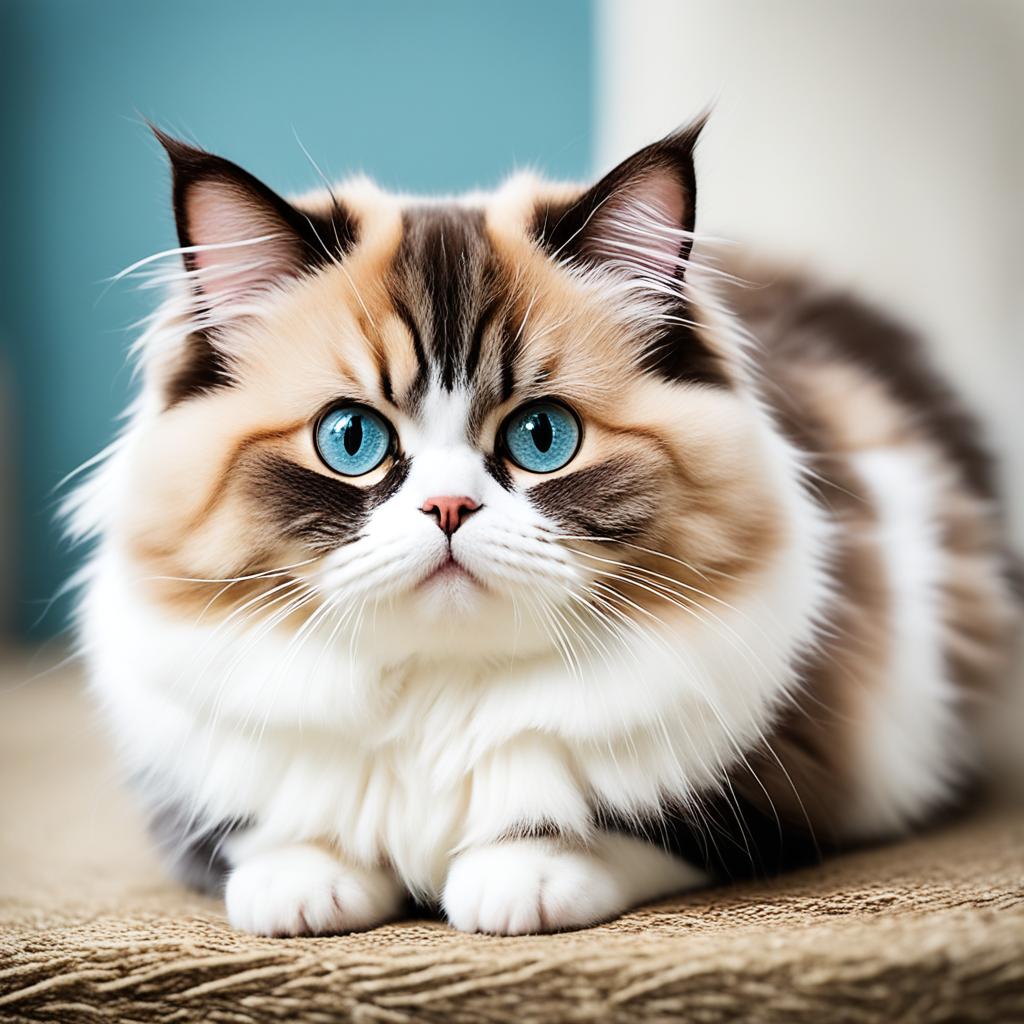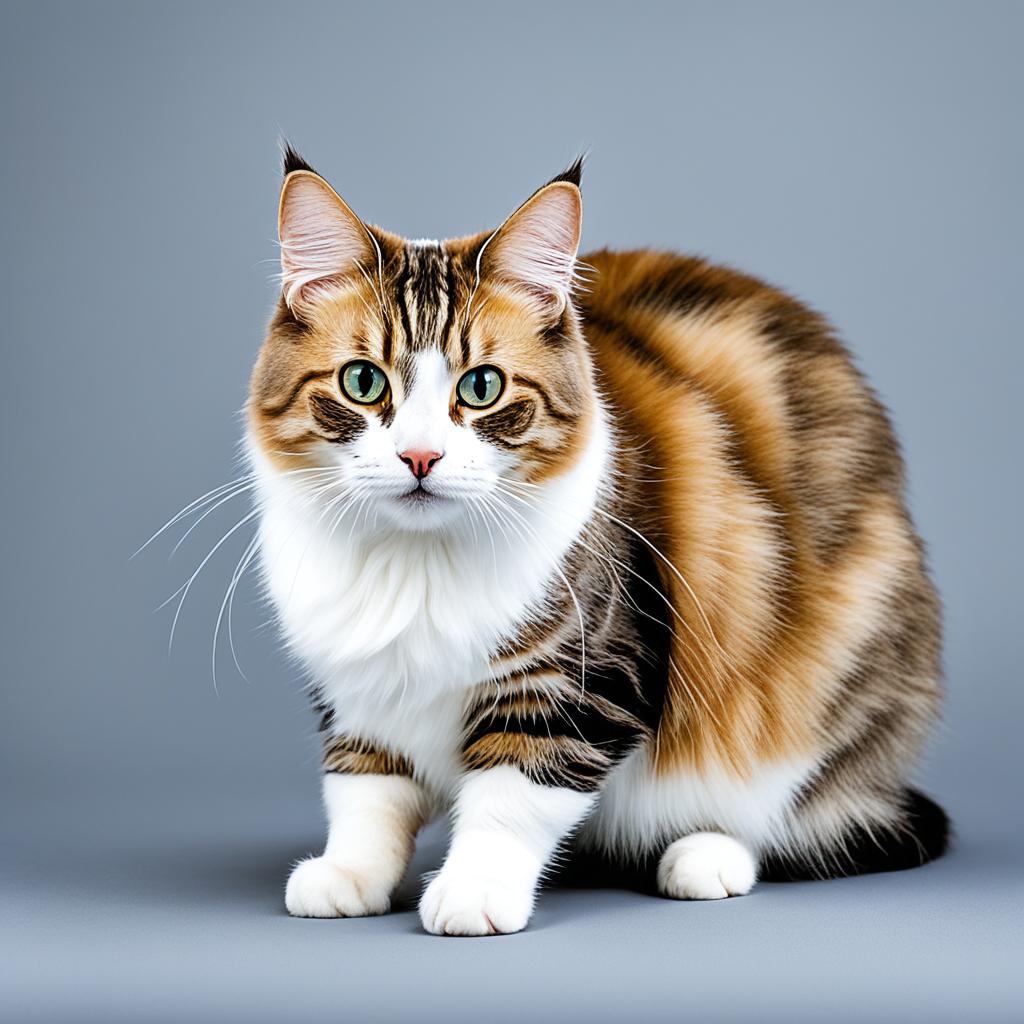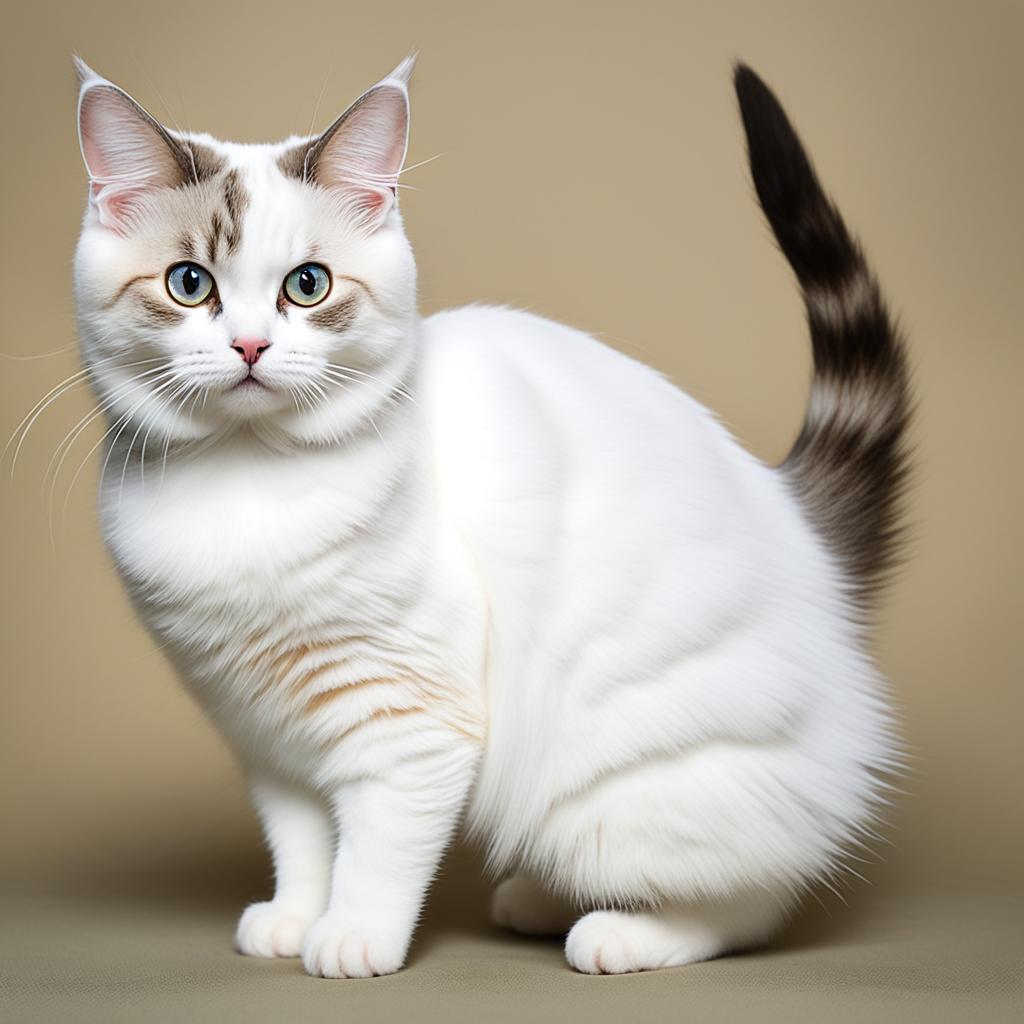What’s the deal with Munchkin cats and their short legs? It’s an interesting question.
Munchkin cats are quite the hit with their little legs. These legs are about 3 inches shorter than most cats. Yet, they don’t let this slow them down. They win over many hearts with their fun and cuddly nature.
These cats weigh from 6 to 9 pounds. They are special enough to be noticed by The International Cat Association (TICA). But, they have not won approval from the Cat Fanciers’ Association (CFA). This is due to worries about their health because of their unique leg trait.
Munchkin cats act a bit like dogs. They form strong bonds with people. They are very smart but also mischievous. They often like to steal small things.
One might think their tiny legs would slow them down. But, Munchkin cats can move and jump just fine. Even so, there are some health issues you should know about. These include problems with their weight, trouble with their spine and chest, and heart and lung issues.
Key Takeaways
- Munchkin cats are recognized by TICA but not by CFA due to health concerns.
- They are known for playful behavior and a strong attachment to their owners.
- Key health concerns include osteoarthritis, lordosis, and pectus excavatum.
- Despite their short legs, Munchkin cats often retain surprising agility.
- Weight management is crucial to mitigate further health issues.
Overview of the Munchkin Cat Breed

Munchkin cats win over hearts with their loving and playful ways. They have much shorter legs than most cats. But, they are very agile, surprising everyone with their quick moves.
History and Origin
Munchkin cats began in the 1980s through a natural genetic twist. Since then, people have debated about their looks and health. Still, they became quite popular quickly.
Unique Physical Characteristics
Munchkins are not your usual cats, thanks to their short legs. They also have a small body and big eyes, making them adorable. You can easily spot a Munchkin in a crowd.
Personality and Temperament
Munchkin cats are known for their playful and loving nature. They are very friendly and keep up their energy as they grow up. They might even stand on their back legs like a prairie dog and ‘borrow’ tiny, shiny things.
Genetic Mutation Leading to Short Legs

Munchkin cats are often called “sausage cats” because of their short legs. This is due to a genetic mutation called chondrodysplasia. It makes Munchkin cats have dwarfism. Some people debate the ethics of breeding for this trait.
Yet, Munchkin cats have a large fan base. Their unique look captures hearts around the globe.
Understanding Dwarfism in Munchkin Cats
Dwarfism makes Munchkin cats stand out. Their legs are short and thick because of this condition. This has sparked discussions among cat lovers.
But, these cats are very lively. They move in a unique, bouncy way. They surprise everyone with how agile they are.
Impact on Mobility and Daily Life
Munchkin cats may face mobility challenges. However, they are playful and full of energy. They move around with ease.
Supporting their living space with pet stairs and fun toys helps them a lot. This ensures they play and explore without trouble.
| Aspect | Details |
|---|---|
| Genetic Mutation | Chondrodysplasia |
| Physical Traits | Shortened leg bones |
| Daily Activities | Playful, energetic, curious |
Common Health Issues in Munchkin Cats

Munchkin cats are known for their short legs and cute personality. Due to their unique build, they face special health issues. Understanding and watching these health concerns is key to keeping your little friend well.
One main issue for Munchkins is osteoarthritis. It happens because of unusual cartilage growth and can cause joint pain. Watching how they move and timely vet visits can help a lot.
Pectus excavatum is another worry, causing an odd chest shape that can harm breathing or the heart. It’s important to keep tabs on your cat’s health with vet visits. This way, any problems can be found and treated early.
Lordosis, where the spine curves too much, is also possible in Munchkins. It brings risks and requires special care. Munchkins might also face other body shape issues, so regular vet check-ups are crucial.
“It’s crucial to stay proactive about your Munchkin’s health to prevent or manage these potential issues effectively.”
Let’s take a closer look at some of their health issues:
| Health Issue | Description | Potential Impact | Monitoring Tips |
|---|---|---|---|
| Osteoarthritis | Abnormal cartilage leading to joint issues. | Reduced mobility and joint pain. | Watch for limping or reluctance to move; consult vet regularly. |
| Pectus Excavatum | Abnormal chest development from birth. | Potential respiratory or cardiac complications. | Monitor breathing and consult the vet for routine checks. |
| Lordosis | Excessive inward curvature of the spine. | Spinal issues and related complications. | Maintain regular vet visits for early detection and management. |
Knowing about the health issues Munchkins might face helps you take action. This way, your little Munchkin can live a happy, healthy life.
Bone and Joint Problems

Munchkin cats are known for their short legs. This cute feature can lead to bone and joint issues. It’s good to know about these problems to keep your Munchkin cat healthy.
Osteoarthritis in Munchkin Cats
Munchkin cats have a unique mutation that makes them short. Unfortunately, this puts them at risk for osteoarthritis. Osteoarthritis causes joint pain and makes it hard for your cat to move around. If your cat is jumping and playing less, it might be a sign of this condition. Visiting the vet regularly can help spot these signs early.
Preventing Joint Degeneration
Preventing joint problems in Munchkin cats is important. You should keep an eye on their diet and make sure they exercise. These steps are key to keeping your Munchkin’s joint health in check. Asking your vet about the right supplements for joint health is also a great idea.
Managing Pain and Mobility
It’s key to be proactive when pain and movement issues arise in Munchkin cats. Your vet can help you come up with a pain management plan, which may include medication. It’s crucial to keep your Munchkin at a healthy weight. This reduces joint stress. With the right care, your Munchkin can stay active and playful.
| Aspect | Recommendations |
|---|---|
| Diet | Balanced, low-calorie diet to prevent obesity |
| Exercise | Moderate, regular exercise to maintain mobility |
| Supplements | Joint-supporting supplements like glucosamine |
| Pain Management | Consult your vet for the best medications and therapies |
Spinal Concerns

Munchkin cats are known for their short legs and playful nature. Yet, they often deal with spine health issues, particularly lordosis. This is a major concern for them.
Lordosis: Symptoms and Management
Lordosis is a serious spinal problem in Munchkins. It makes the spine curve inwards too much. This can lead to pain and problems moving. It’s important to spot these signs early.
Treatment for lordosis includes working closely with a vet. They might suggest pain relief, therapy, or even surgery. The aim is to keep your cat happy and moving.
Preventative Care and Monitoring
Prevention is key for Munchkin cat health. Make sure they see the vet regularly. A good diet and exercise can lower the lordosis risk.
Keeping a Munchkin at a healthy weight is also crucial. It lightens the load on their spine. This helps avoid making spine problems worse.
Watch your Munchkin closely and act fast if you notice any signs of lordosis. With good care, your cat can enjoy a long and healthy life.
Pectus Excavatum in Munchkin Cats

Munchkin cats are known for their unique looks but they can face a health challenge. They may develop a condition called Pectus Excavatum. This creates a sunken chest look. While it’s not always easy to spot, it’s important to know about it.
Identifying the Condition
To spot Pectus Excavatum in Munchkin cats, watch for certain signs. They might have trouble breathing, seem tired, or struggle with exercise. It’s key to notice these issues early to avoid serious problems.
Treatment Options and Outcomes
When a Munchkin cat is diagnosed, the treatment can be different for each cat. Mild cases might only need careful watching. But for more serious cases, surgery is an option. Surgery aims to make breathing and the heart work better, improving the cat’s life quality. Starting treatment early and regular vet visits are important for success.
| Treatment Method | Severity Level | Expected Outcome |
|---|---|---|
| Conservative Monitoring | Mild | Manageable symptoms, regular follow-up |
| Surgical Intervention | Severe | Improved respiratory and cardiac functions |
Munchkin Cat Weight Management

Maintaining the right weight for your adorable Munchkin cat is key to their health. Their short legs already face challenges. We must avoid adding extra weight on them.
Risks of Obesity
Obesity risks in Munchkin cats are serious. Extra weight can cause joint pain and limit movement. It also raises the risk of diabetes, breathing problems, and heart disease. So, managing their weight is very important.
Diet and Exercise Recommendations
Working with your vet to create a Munchkin cat diet plan is a great start. Choose high-quality, nutritious food and control how much they eat. Playful exercise for Munchkin cats is essential, too.
Get them moving by chasing toys or climbing mini structures. This helps burn calories and keeps them mentally sharp. It promotes good health overall.
- Consult with your vet to create a personalized diet plan.
- Avoid free-feeding and stick to measured portions.
- Incorporate interactive toys and activities into daily routines.
By focusing on their diet and exercise, your Munchkin cat can stay fit. This will help them live a longer, healthier life.
Munchkin Cat Health Tips

Keeping your Munchkin cat healthy is more than visiting the vet. You need to make sure they see a vet regularly. This helps spot early signs of sickness. It also lets you talk about how to stop health problems before they start.
- Give your cat food that keeps them healthy. A good diet will stop them from getting too heavy.
- Keeping them moving is also key. Use toys and play to make sure they get enough exercise.
- And don’t ignore their teeth. Brushing them or giving them special treats will fight off tooth problems.
Grooming is very important for your Munchkin cat’s health too. For some, this means brushing their fur often. Doing this stops tangles and keeps their skin healthy. Plus, it makes them look and feel better.
“The secret to a healthy Munchkin? Consistent care and love!” – Every Happy Munchkin Owner
So, be active in taking care of your cat’s health. This, along with the right food, enough play, and caring for their teeth and fur, will improve their life. And a happy cat means a happy home for everyone.
Veterinary Care for Munchkin Cats
Keeping your Munchkin cat healthy is vital. These cute cats have special health needs because of their small size. It’s crucial to take them for regular check-ups. This helps to spot any health problems early and keep your pet well.
Regular Check-ups
Regular vet visits are crucial for Munchkin cats. At these times, the vet checks your cat’s health. They pay extra attention to their bones, joints, and how they breathe. By finding problems early, these check-ups help keep your Munchkin happy and frisky.
Diagnostic Procedures
Diagnostics that are special for Munchkin cats can uncover health issues. Things like X-rays and blood tests show what’s going on inside. This is key for conditions like lordosis or pectus excavatum. It helps your vet choose the best treatments. With these advanced tests, your Munchkin cat can get the right care. This way, big health issues can be managed well.
FAQ
What are common health issues in Munchkin cats?
Munchkin cats often deal with several health problems. These include osteoarthritis, lordosis, and pectus excavatum. It’s very important to see a vet regularly to keep these issues under control.
Are Munchkin cats prone to specific diseases?
Yes, some diseases are more common in Munchkin cats. They may face joint and spinal issues like osteoarthritis and lordosis. Plus, they could have breathing and heart problems due to pectus excavatum.
How does dwarfism affect Munchkin cats?
Dwarfism makes Munchkin cats have shorter legs due to a genetic change. This impacts how they move and their long-term health. Owners need to provide extra care for them.
What are the symptoms of osteoarthritis in Munchkin cats?
Osteoarthritis symptoms in Munchkin cats can include limping and not wanting to jump. They may seem stiff or show signs of pain when touched. Regular vet visits can help spot and treat these signs.
How can I prevent joint degeneration in my Munchkin cat?
Keeping your Munchkin cat at a healthy weight is crucial for preventing joint issues. A good diet and gentle, but regular, exercise are important. Ask your vet about supplements and ways to manage pain.
What is lordosis and how does it affect Munchkin cats?
Lordosis is when the spine curves inward too much. In Munchkin cats, it can lower their movement ability and cause discomfort. Vets need to keep an eye on them to treat it.
How do I identify pectus excavatum in my Munchkin cat?
If your cat has pectus excavatum, it will look like their chest is sunken. This needs close watching as it’s not always easy to see at first. Your vet can diagnose it accurately and plan the right treatment.
What are the treatment options for pectus excavatum in Munchkin cats?
The treatment for pectus excavatum varies. It can range from just keeping an eye on it to surgery in critical cases. Finding it early and acting quickly can really help your cat’s quality of life.
Why is weight management important for Munchkin cats?
Munchkin cats’ shorter legs mean they’re vulnerable to joint and spine problems. Extra weight can make things worse. Proper weight management through diet and activity is vital.
What are some diet and exercise recommendations for Munchkin cats?
Craft a diet that helps your Munchkin cat stay slim yet healthy. Be strict about portion sizes and only choose high-quality food. Engage them in light, fun activities. Always check with your vet for tailored advice.
What health tips should I follow for my Munchkin cat?
Keep up with vet visits, feed them well, and get them moving. Preventive care is crucial. Don’t forget about dental care and grooming, especially for those with long hair.
How often should my Munchkin cat have regular check-ups?
Munchkin cats need a yearly trip to the vet at least. If they’re dealing with health issues, they might need to go more often. These visits help monitor their health and catch problems early.
What diagnostic procedures are important for Munchkin cats?
Key tests like X-rays, blood work, and checks on their joints are crucial for Munchkin cat health. A vet’s guidance is key for an effective health care plan.




